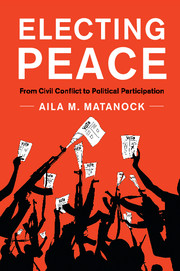
-
Select format
-
- Publisher:
- Cambridge University Press
- Publication date:
- 21 July 2017
- 25 July 2017
- ISBN:
- 9781316987179
- 9781107189171
- 9781316638811
- Dimensions:
- (228 x 152 mm)
- Weight & Pages:
- 0.57kg, 334 Pages
- Dimensions:
- (229 x 152 mm)
- Weight & Pages:
- 0.5kg, 336 Pages
You may already have access via personal or institutional login
Book description
Settlements to civil conflict, which are notably difficult to secure, sometimes contain clauses enabling the combatant sides to participate as political parties in post-conflict elections. In Electing Peace, Aila M. Matanock presents a theory that explains both the causes and the consequences of these provisions. Matanock draws on new worldwide cross-national data on electoral participation provisions, case studies in Central America, and interviews with representatives of all sides of the conflicts. She shows that electoral participation provisions, non-existent during the Cold War, are now in almost half of all peace agreements. Moreover, she demonstrates that these provisions are associated with an increase in the chance that peace will endure, potentially contributing to a global decline in civil conflict, a result which challenges prevailing pessimism about post-conflict elections. Matanock's theory and evidence also suggest a broader conception of international intervention than currently exists, identifying how these inclusive elections can enable external enforcement mechanisms and provide an alternative to military coercion by peacekeeping troops in many cases.
Awards
Winner, 2018 Charles H. Levine Memorial Book Prize, International Political Science Association
Reviews
‘Matanock's terrific book sheds light on the relatively new phenomenon of crafting peace agreements that include provisions for the political participation of former rebels. She uses new data to deftly weave together analysis of peace agreements, peacekeeping, peace duration, elections, and election monitoring - topics that are typically considered separately – and provide a comprehensive and compelling argument for the importance of formally integrating former rebels into post-conflict governance.'
Tanisha Fazal - University of Minnesota
‘Almost half of all elections globally occur in the shadow of violent conflict, and post-conflict elections have become vital international tools of peacebuilding and democratization. Yet these elections, fraught with tension and high stakes, have an unenviable track record: as often as not, they lead to conflict recidivism and democratic decline. Against this backdrop, Aila M. Matanock's Electing Peace sounds a clarion call to keep the faith. The key is to create a path for yesterday's combatants to become tomorrow's politicians. When such a path is seen as credible by warring parties, they are more likely to trade tanks for campaign buses and guns for microphones. This is a must-read for academics and policymakers who aspire to build peace through democracy in conflict-afflicted countries.'
Irfan Nooruddin - Georgetown University, Washington DC, and author of Elections in Hard Times
'Aila M. Matanock helps solve one of the hardest problems associated with civil wars: how to get a successful peace agreement without the help of a third party military intervention. Using new cross-national data on peace agreements and detailed analysis of Guatemala and El Salvador, Matanock shows us how electoral participation can help combatants enforce agreements. Bravo!'
Barbara F. Walter - University of California, San Diego
'Matanock provides a refreshingly positive and constructive appraisal of democratic peacebuilding … Matanock’s study is a much-welcomed contribution to the field and one that will be of great value to both policymakers and academics.'
Richard Lappin Source: Democratization
‘Electing Peace advances our thinking and knowledge about the range of options available to facilitate peace agreements and ultimately long-term peace.'
Beth A. Simmons Source: Democratization
'Perhaps the most important contribution of Electing Peace is the insight it offers into ongoing debates over the dangers of democratization, as well as whether postconflict elections incite a return to violence. Matanock tackles these timely questions with clarity and authority. This is an exemplary piece of scholarship whose attention to context and nuance rewards its readers with generalizations that are at once 'big' and 'bounded' … As such, it is an important book that deserves a wide audience.'
Daniela Donno Source: Perspectives on Politics
'Matanock's book is a must-read for all scholars and practitioners interested in understanding how elections and outside engagement can help end modern civil wars.'
Hannah Smidt Source: Africa Spectrum
'The extremely thorough research approach, the systematic approach of the author and her invigorating mixture of fundamental political considerations with statistical material and interview results make the book … not only worth reading for dealing with the special election aspect after civil wars, but also in general for the topic of Peace processes after civil wars.'
Burkhard Luber Source: Milieu
Contents
Metrics
Altmetric attention score
Full text views
Full text views help Loading metrics...
Loading metrics...
* Views captured on Cambridge Core between #date#. This data will be updated every 24 hours.
Usage data cannot currently be displayed.
Accessibility standard: Unknown
Why this information is here
This section outlines the accessibility features of this content - including support for screen readers, full keyboard navigation and high-contrast display options. This may not be relevant for you.
Accessibility Information
Accessibility compliance for the PDF of this book is currently unknown and may be updated in the future.


